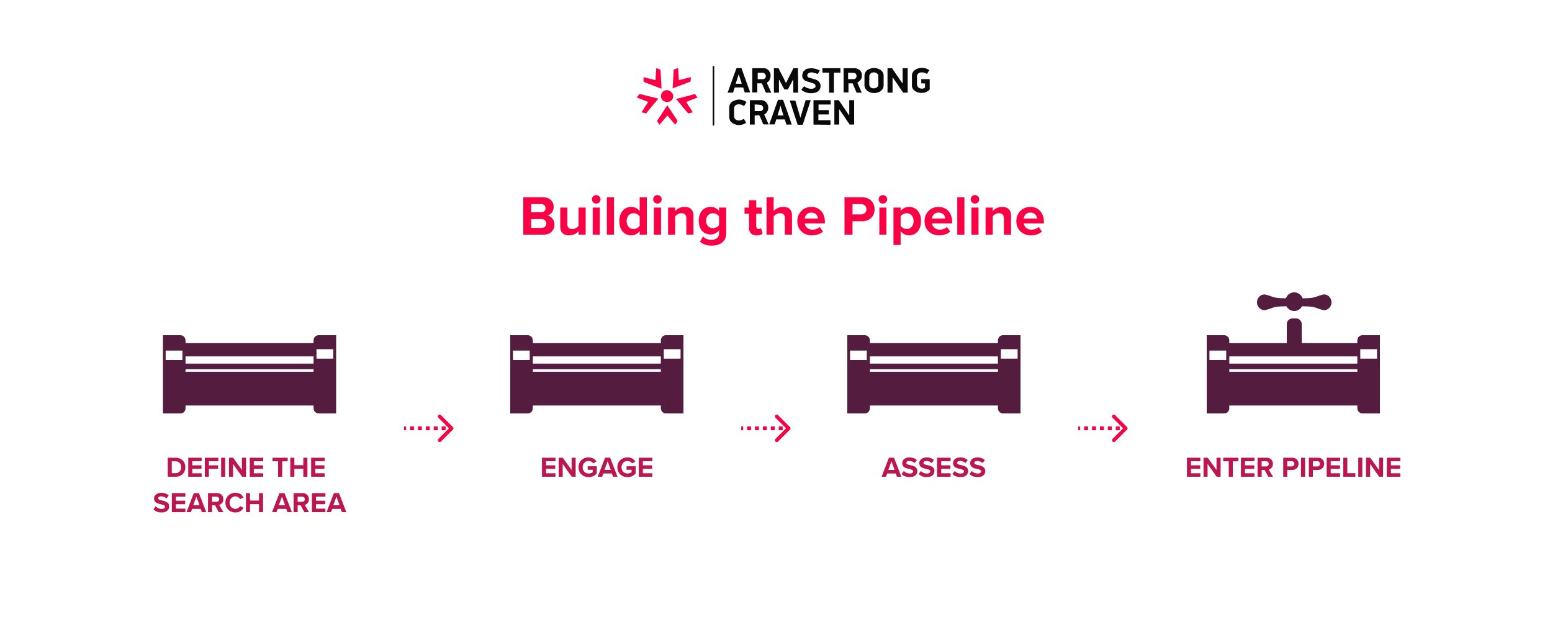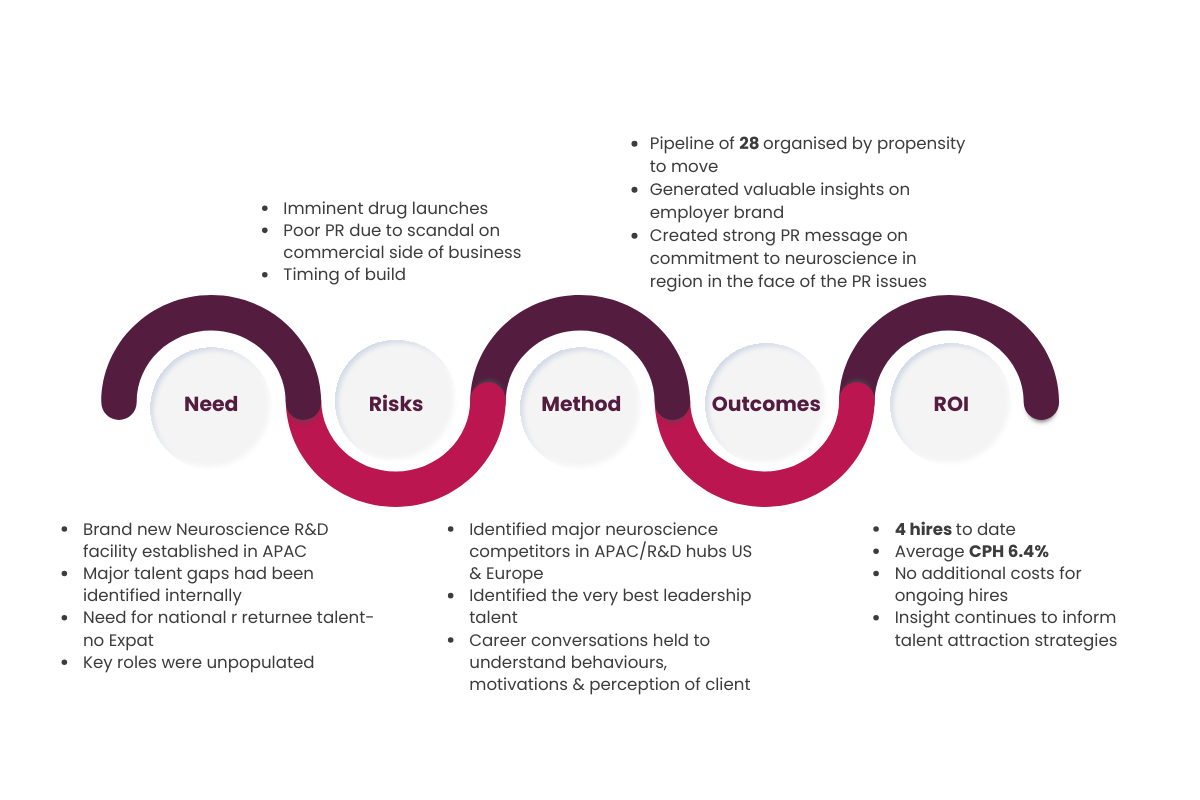A Comprehensive Guide to Talent Pipelining
05 Dec, 20237 mins
As organisations navigate expansions into new markets or address talent shortages in specific areas of their businesses, the concept of a talent pipeline becomes a strategic necessity. This proactive approach to talent management caters to immediate and future staffing needs and provides significant benefits that extend well beyond traditional and often ineffective recruitment practices.
This insightful guide will first answer the most vital question - what is talent pipelining? We will explore what talent pipelining is used for, its key benefits, and what the talent pipelining process looks like.
What is Talent Pipelining?
Talent Pipelining is the process of identifying and engaging with the talent you need in the market ahead of need. By building relationships with individuals in a talent pipeline over a period of time, you can have constant access to the talent you want without relying on reactive recruitment processes that are often lengthy and expensive. The beauty of Talent Pipelining is that you can link it to your business strategy, so you build Pipelines of Talent that meet today’s and tomorrow’s needs.
Whereas traditional recruitment is all about fire fighting - there is a critical vacancy and a huge rush to fill it, Talent Pipelining is strategic and takes a longer-term approach. Talent Pipelining enables you to build and nurture relationships with the talent you need in the external market, regardless of whether it is passive or active, ahead of a vacancy. So that when the time comes to hire, you are on the front foot - you know the talent you need, the talent is already engaged with your company, and attracting and securing the hire is faster and smoother.
What is Talent Pipelining Used for?
Talent Pipelining is hugely versatile and can be used for a number of reasons:
Succession Planning - building an external talent pipeline to complement or strengthen your internal succession bench
Diversity, Equity, and Inclusion - proactively increasing representation from particular target populations
Multiple or recurring hires - enabling a continuous relationship with the talent you need in a given market
New skills acquisition or new market entry - when you are hunting for talent in previously unchartered waters
Talent Pipelining as a Talent Acquisition Tool
Talent Pipelining allows Talent Acquisition and In-house Executive Search teams to nurture and build relationships with prospective candidates well before specific roles become vacant. This removes the reactive nature and the rush for TA to find candidates for immediate needs, enables proactive workforce planning, and reduces the risk of an unsuccessful hire.
Talent Pipelining for Employer Perception Management
Talent Pipelining is insight-rich and can help businesses understand how candidates perceive them and, in turn, understand the motivations, preferences, and barriers of specific talent pools, thus ensuring your talent attraction strategies are optimised. By understanding how your employer brand is perceived, you can gain a competitive edge in attracting the best talent for the future.
Typical Questions that Talent Pipelining can Answer?
What are our future talent needs, and how can we proactively prepare for them?
How can we engage in proactive workforce planning to ensure a steady supply of qualified candidates for key roles?
How can we align the talent pipeline with the ourstrategic business goals and priorities?
How can we identify and build proactive relationships with diverse talent?
What strategies can we employ to effectively source and engage candidates, especially passive talent, for future opportunities?
How are candidates in our market perceiving our brand?
The Talent Pipelining Process

What is the Talent Pipelining Process?
Talent pipelining is a comprehensive approach to engaging individuals in meaningful 'career conversations' that delve into the intricacies of an individual's professional journey and future ambitions.
Rather than the standard headhunter approach of a route one, "Do you want a job?" talent pipelining treats the candidate as a VIP. Through insightful questions that explore the candidate's current career stage, aspirations, job satisfaction, motivators, industry influencers, and potential future moves, the process is deliberately future-focused, eliminating the need for pressurised and immediate decisions. This allows both parties the luxury of time.
Talent Pipelining empowers candidates to take control of their careers. The principle is simple: Build relationships with businesses of interest before you contemplate a change. This philosophy also extends to companies, who are encouraged to proactively cultivate relationships with potential talent.
Talent Pipelining positions individuals to explore opportunities, build relationships, and make informed decisions about their career trajectories. In this process, both talent and organisations gain a valuable opportunity to align their visions and goals before making significant commitments.
The Talent Pipelining process is broken down into three parts:
Build - identify the talent you need in line with the situation. Engage and assess them against your brief and select those who are relevant and interested in entering the pipeline.
Manage - a Talent Pipeline has to be proactively managed and nurtured. The talent should be socialised with on a regular basis, enabling you to keep the dialogue and emotional attachment alive and expectations managed. This is critical to protecting your employer brand.
Activate - activate the pipeline when you are ready to hire by discussing a specific need and prioritising the most relevant individuals to enter into your full hiring process.
What are the Benefits of Talent Pipelining?
Now that you understand what Talent Pipelining is and what the Talent Pipelining process looks like, we will next explore the key benefits that Talent Pipelining can have for your business.
Enhances Succession Planning
A robust talent pipeline strategy is a vital asset to succession planning.
By building an external succession talent pipeline for critical roles, you can strengthen your internal succession bench, cover gaps where internal talent doesn’t exist, and, more importantly, you can gain access to new and diverse thinking and new skills that are aligned with your future business strategy, that may not yet exist internally.
Reduces Time to Hire
Given that identifying the perfect candidate can often take several months, having pre-qualified individuals in the talent pool streamlines and adds agility to the recruitment process. This, in turn, reduces the organisation's time-to-hire.
Improves Workforce Diversity
Talent pipelines allow talent acquisition to source candidates from diverse groups they’d like to target, including those from different sectors, countries, and cultures, and build relationships with them ahead of need. Then, when a future position becomes available, they have a strong candidate pipeline from underrepresented groups that can be considered for the positions. This approach is particularly valuable when talent from a given underrepresented group in a given sector or job family is scarce. Trying to obtain a diverse shortlist is a typical metric adopted by many companies, but one that often fails if the talent supply cannot support it.
Attraction of Higher-Quality Talent
The talent pipelining approach takes the time to develop rich insights into what each professional brings to the table while deciding if they would fit the business's culture and values. This removes much of the guesswork and chance from the hiring process and leads to better-quality hires.
Engagement with Passive Candidates
Talent pipelines allow talent acquisition to identify and build relationships with passive candidates without pushing specific job vacancies. Over time, you can introduce potential upcoming job roles that could be a good fit for their skills, personality, and experience and see if they resonate.
Boost Retention
Ongoing engagement with individuals in the candidate pipeline provides potential future employees with vital insights into the organisation's culture, values, benefits, and career development prospects.
This transparency reduces surprises and disappointments after professionals accept job offers, increasing their commitment to the organisation and enhancing long-term retention. Organisations benefit from having fully prepared and motivated talent to embark on their new roles with the development of long-term careers in mind. Effectively, by socialising a talent pipeline well, the talent is already onboarding as it gets to know the culture of your business before joining.
Supports Expansions into New Markets
Building a talent pipeline can significantly support an organisation in its expansion into a new market in several ways:
Local expertise - Talent Pipelining provides a competitive advantage by establishing a talent pipeline with individuals with local expertise, cultural knowledge, and language proficiency.
Quicker Ramp-Up - New market expansion often requires hiring a considerable workforce quickly. A talent pipeline strategy allows the organisation to have pre-screened and qualified candidates ready to step into key roles.
Adaptability - Markets can be unpredictable, and businesses may need to pivot or adjust their strategies based on evolving market conditions. Talent Pipelining provides individuals who can quickly respond to changing market dynamics, giving the organisation the agility needed to thrive in a new environment.
Armstrong Craven can Overcome your Talent Pipelining Challenges
While talent pipelining is a valuable strategy for proactive recruitment, it does have some challenges if businesses go it alone. These challenges include:
Developing and nurturing a robust candidate pipeline demands a considerable investment of time and effort. This strategic approach is inherently long-term, requiring patience as it takes time to yield tangible results.
Striking the right balance between the quantity and quality of candidates further adds to the complexities of this crucial process.
Ensuring the alignment of the talent pipeline with overarching business goals and priorities is paramount whilst simultaneously maintaining a commitment to diversity and inclusion.
As a Talent Research provider with over 30 years of Talent Pipelining, Armstrong Craven stands ready to be your strategic partner and an extension of your team. We have the expertise to overcome these challenges and build a dynamic and diverse talent pipeline, unlocking your organisation's full potential.
Our Talent Pipelining Success Stories
Discover how our Talent Pipelining service has supported businesses worldwide to elevate their talent strategies and drive their future.
Talent Pipelining for a Global Financial Services Company
Explore how we supported one of the world’s leading financial services organisations to find talent for senior relationship management roles.
Talent Pipelining for a Leading US Bank
Discover how Armstrong Craven developed a talent pipeline focused on underrepresented candidates who could develop into a C-level role as a critical leadership role approached retirement.
Talent Pipelining for an Asian Neuroscience Leadership Talent
Explore how Talent Pipelining can Empower your Business
Transform and future-proof your talent acquisition strategy with Armstrong Craven’s Talent Pipelining solution. Our expert team takes care of the entire process, from screening candidates to delivering a talent pool of ready-to-hire professionals for your current and future needs.
Contact the Armstrong Craven team today for more information about how Talent Pipelining, Talent Mapping, Talent Insight, and Executive Search can elevate your businesses.
Speak with an expert
If you want to learn a little more about what we do and how talent research can help you make better-informed business decisions, our team of talent research and consulting specialists are happy to help.







